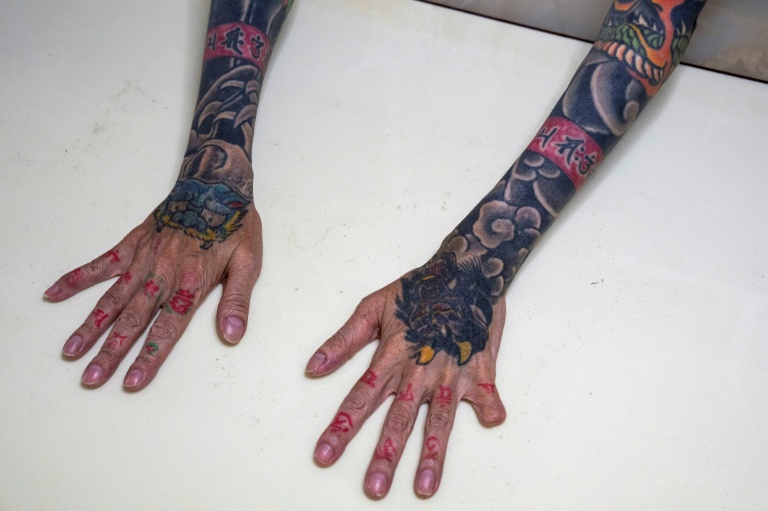World
Rare Female Yakuza Mako Nishimura Forges New Path to Redemption

Mako Nishimura, one of Japan’s few female yakuza, is transforming her life after escaping the criminal underworld. Once a prominent member of the notorious yakuza network, she now dedicates her time to helping former gangsters reintegrate into society. With a missing fingertip as a reminder of her past, Nishimura’s journey highlights the changing landscape of yakuza in contemporary Japan.
The yakuza, a multi-billion-dollar organized crime syndicate, has been a dominant force in Japan’s illicit activities, including drug trafficking and gambling. However, its influence is waning. Recent reports indicate that yakuza membership has fallen below 20,000 for the first time since records began in 1958, largely due to intensified police crackdowns and stricter anti-mafia legislation.
Struggles in a Male-Dominated World
At 58 years old, Nishimura reflects on her three-decade journey through the patriarchal structure of the yakuza. “Rival gangsters looked down on me just because I was a woman,” she said in an interview. “I wanted to be acknowledged as a yakuza, so I learned to speak, look, and fight like a man.” Her official recognition as the first female yakuza came after her conviction for drug possession at the age of 22.
Despite the lack of official data on female yakuza members, experts, including retired anti-mafia detective Yuichi Sakurai, acknowledge that women in the organization are exceedingly rare. “In my 40 years of experience, I have never seen a woman yakuza,” Sakurai stated. Nishimura’s journey is not only unique but also emblematic of the broader challenges facing women in organized crime.
Five years ago, she left the yakuza behind, seeking a path to redemption. Today, she works at demolition sites—one of the few jobs that accept her full-sleeve tattoos—and leads the Gifu branch of Gojinkai, a non-profit organization focused on assisting former criminals in their reintegration.
A New Mission and Mentorship
Nishimura’s community efforts include organizing monthly litter-picking trips with a group of former gangsters. “She’s like a big sister,” said Yuji Moriyama, one of her mentees. “She scolds us when we deserve it.” Moriyama recalls a time he skipped the trash collection, only to be made to kneel in apology by Nishimura, who commands respect and admiration from her peers.
Finding purpose in her work gives Nishimura confidence. “The idea I’m doing something good for other people gives me confidence,” she explained. “I’m slowly returning to a normal human being.”
Nishimura’s past is marked by hardship. Raised in a strict household with high academic expectations, she turned to crime as a teenager, joining a major yakuza clan by age 20. The lifestyle included violence, extortion, and drug trafficking. In a grim ritual of self-punishment, she even cut off her own fingertip.
She eventually left the yakuza to marry and raise her son, discovering a maternal instinct she had never known. Yet, her journey was far from straightforward. After being dismissed from jobs in the care and medical fields due to her tattoos, Nishimura found herself relapsing into drug sales.
In her late 40s, she briefly rejoined her old gang but found it diminished and lacking dignity. “Yakuza used to be the king of villains,” she said, expressing disillusionment as she witnessed the struggles of her former associates.
Now, with the financial support from her recently published autobiography, Nishimura continues her work with Gojinkai. She has also found a mentor in Satoru Takegaki, chairman of the organization and a former gangster himself.
“I think yakuza will keep shrinking,” she stated, expressing hope for the future. “I hope they will become extinct.” As Nishimura navigates her new life, her story serves as a reminder of the complexities of identity, redemption, and the ongoing evolution of organized crime in Japan.
-

 Politics4 weeks ago
Politics4 weeks agoSecwepemc First Nation Seeks Aboriginal Title Over Kamloops Area
-

 World5 months ago
World5 months agoScientists Unearth Ancient Antarctic Ice to Unlock Climate Secrets
-

 Entertainment5 months ago
Entertainment5 months agoTrump and McCormick to Announce $70 Billion Energy Investments
-

 Science5 months ago
Science5 months agoFour Astronauts Return to Earth After International Space Station Mission
-

 Lifestyle5 months ago
Lifestyle5 months agoTransLink Launches Food Truck Program to Boost Revenue in Vancouver
-

 Technology3 months ago
Technology3 months agoApple Notes Enhances Functionality with Markdown Support in macOS 26
-

 Lifestyle3 months ago
Lifestyle3 months agoManitoba’s Burger Champion Shines Again Amid Dining Innovations
-

 Top Stories2 months ago
Top Stories2 months agoUrgent Update: Fatal Crash on Highway 99 Claims Life of Pitt Meadows Man
-

 Politics4 months ago
Politics4 months agoUkrainian Tennis Star Elina Svitolina Faces Death Threats Online
-

 Sports5 months ago
Sports5 months agoSearch Underway for Missing Hunter Amid Hokkaido Bear Emergency
-

 Politics5 months ago
Politics5 months agoCarney Engages First Nations Leaders at Development Law Summit
-

 Technology5 months ago
Technology5 months agoFrosthaven Launches Early Access on July 31, 2025





















